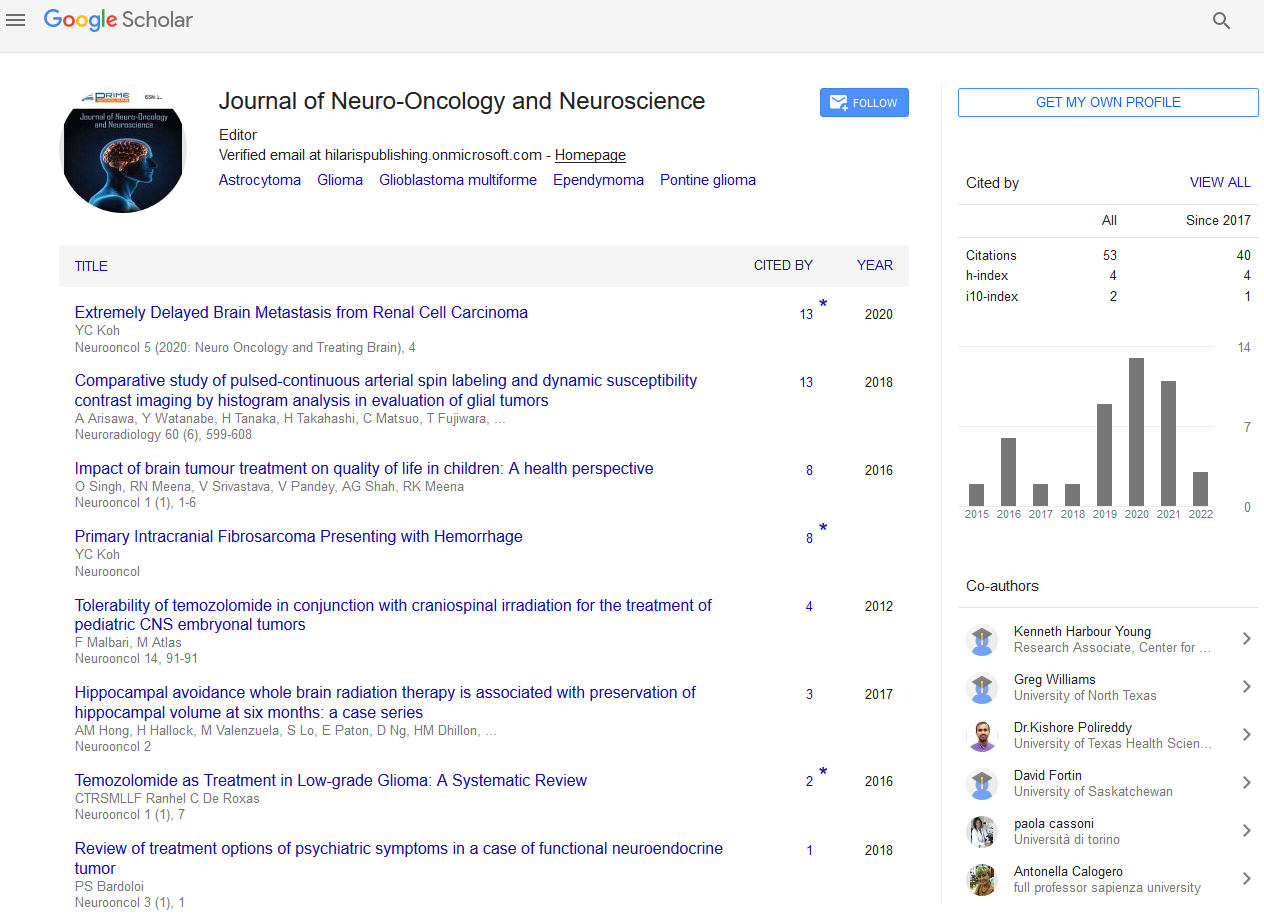Commentary Article - (2023) Volume 8, Issue 4
Personalizing Care: Precision Medicine Revolutionizes Neuro-oncology
Alfredo Puget*
Department Neuro-oncology, University College London, United Kingdom
*Correspondence:
Alfredo Puget,
Department Neuro-oncology, University College London,
United Kingdom,
Email:
Received: 29-Nov-2023, Manuscript No. IPJNO-24-19617;
Editor assigned: 01-Dec-2023, Pre QC No. IPJNO-24-19617 (PQ);
Reviewed: 15-Dec-2023, QC No. IPJNO-24-19617;
Revised: 20-Dec-2023, Manuscript No. IPJNO-24-19617 (R);
Published:
27-Dec-2023, DOI: 10.21767/2572-0376.8.4.32
Description
In the realm of neuro-oncology, precision medicine has
emerged as a transformative approach to diagnosis, treatment,
and management of brain tumors. Traditional therapies often
provide limited efficacy due to the heterogeneity of these
tumors, but precision medicine tailors treatment strategies
to the specific molecular and genetic characteristics of each
patient’s tumor. This personalized approach holds promise
for improving outcomes, enhancing treatment responses,
and minimizing adverse effects. By integrating advanced
molecular profiling, targeted therapies, and novel treatment
modalities, precision medicine is revolutionizing the field of
neuro-oncology. Central to the concept of precision medicine
in neuro-oncology is the molecular characterization of
brain tumors. Through techniques such as next-generation
sequencing (NGS), gene expression profiling, and proteomic
analysis, clinicians can identify specific genetic mutations,
aberrant signaling pathways, and biomarkers that drive tumor
growth and progression. This molecular profiling provides
valuable insights into the underlying biology of brain tumors,
allowing for more accurate diagnosis, prognostication, and
treatment selection.
One of the key applications of precision medicine in neurooncology
is the identification of targetable molecular alterations.
Targeted therapies selectively inhibit or disrupt specific
molecular targets involved in tumor growth, proliferation,
and survival. For example, inhibitors of the epidermal growth
factor receptor (EGFR), such as erlotinib and gefitinib, have
shown efficacy in treating glioblastoma patients with EGFR
mutations or amplifications. Similarly, inhibitors targeting the
mammalian target of rapamycin (mTOR), such as temsirolimus
and everolimus, have demonstrated activity in patients with
mTOR pathway activation. Moreover, precision medicine
enables the development of combination therapies that target
multiple pathways simultaneously, overcoming treatment
resistance and enhancing therapeutic efficacy. Combinatorial
approaches may involve the use of targeted agents with
complementary mechanisms of action or the integration of
targeted therapies with conventional treatments such as
surgery, radiation therapy, and chemotherapy. By targeting
different vulnerabilities within the tumor microenvironment,
combination therapies offer the potential for synergistic effects
and improved treatment outcomes.
Another promising application of precision medicine in neurooncology
is the use of predictive biomarkers to guide treatment
decisions and monitor treatment response. Biomarkers such
as circulating tumor DNA (ctDNA), microRNA expression
profiles, and radiomic features extracted from imaging studies
can provide real-time information about tumor dynamics,
treatment response, and disease progression. By monitoring
changes in biomarker levels over time, clinicians can adjust
treatment regimens accordingly, optimizing therapeutic efficacy
and minimizing the risk of treatment-related toxicity. Despite
these advancements, challenges remain in the implementation
of precision medicine in neuro-oncology. Tumor heterogeneity,
intra-tumoral and inter-tumoral variability, and the
development of treatment resistance pose significant obstacles
to successful treatment outcomes. Moreover, access to
advanced molecular profiling technologies, high-cost targeted
therapies, and specialized expertise may limit the widespread
adoption of precision medicine approaches, particularly in
resource-limited settings.
Precision medicine represents a paradigm shift in the
management of brain tumors, offering personalized treatment
approaches tailored to the specific molecular and genetic
characteristics of each patient’s tumor. By integrating advanced
molecular profiling, targeted therapies, combination regimens,
and biomarker-guided monitoring, precision medicine holds promise for improving outcomes and quality of life for patients
with brain tumors. Through continued research, innovation,
and collaboration, we strive to realize the full potential of
precision medicine in neuro-oncology and transform the
landscape of brain tumor treatment.
Acknowledgement
None.
Conflict Of Interest
The author’s declared that they have no conflict of interest.
Citation: Puget A (2023) Personalizing Care: Precision Medicine Revolutionizes Neuro-oncology. Neurooncol. 8:032.
Copyright: © 2023 Puget A. This is an open-access article distributed under the terms of the Creative Commons Attribution License, which permits unrestricted use, distribution, and reproduction in any medium, provided the original author and source are credited.

